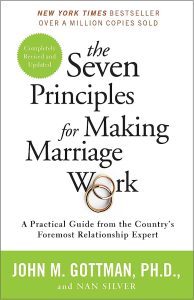Written by Linda Nelson, MS, LPC
Summer. An historically popular season for weddings. And no wonder, as young people complete their preparations for a life of supporting themselves and those they love, generally those they will make a life with as spouses, and also the children they will bring into their lives. Most of us have heard for years of the devastating statistics about the lack of success of so many marriages in our culture, even Christian marriages, and we might expect more of the younger and older generations alike to be discouraged. Yet as so many others have pointed out, people continue to marry.
Anyone seeking help for their marriage will find many books on the topic. Christians specifically will find a great many books by bible experts, pastors, counselors, and others available to them. Yet finding happiness in marriage seems still to elude so many of us. Therefore, I was surprised when one of the partners of a couple I have been working with regarding their own marital struggles, handed me a book by a Jewish professor of psychology, who directs his own institute and does scientific studies of family and marriage.
 The Seven Principles for Making Marriage Work is the tenth book written by John Gottman on the topic of marriage. It contains information that most of us are familiar with, such as the accepted dos and don’ts and the biblical meaning, purpose, and guides for marriage. However, in this book, Dr. Gottman offers a fresh priority: the gut level desire for true friendship to be obtained by being just that to one’s own spouse, being the true friend that we desire the other to be to us. Our understanding of this is most likely understood early in relationships with a potential spouse, but so often forgotten in the working-out of priorities in close relationship. What makes for happiness in all relationships of meaning has too often been overlooked, or at least somehow been put further down the list of other priorities in the most important relationship in this life.
The Seven Principles for Making Marriage Work is the tenth book written by John Gottman on the topic of marriage. It contains information that most of us are familiar with, such as the accepted dos and don’ts and the biblical meaning, purpose, and guides for marriage. However, in this book, Dr. Gottman offers a fresh priority: the gut level desire for true friendship to be obtained by being just that to one’s own spouse, being the true friend that we desire the other to be to us. Our understanding of this is most likely understood early in relationships with a potential spouse, but so often forgotten in the working-out of priorities in close relationship. What makes for happiness in all relationships of meaning has too often been overlooked, or at least somehow been put further down the list of other priorities in the most important relationship in this life.
If we consider this as a highly important element of marriage, a lot of other priorities may begin to slip away, taking a much lower position in that hierarchy. Having been told this myself by a Christian counselor almost 30 years ago, I was pleasantly surprised to become acquainted with Dr. Gottman’s insights gained through a scientific approach and supported by the statistically reduced number of divorces by those couples who participated in his studies and seminars. That alone might persuade us to see what he has to put before us in this book, but indeed his findings make so very much sense, as well. I suspect all of us who are married can attest to the truth behind those findings. Specifically, how many of us have always longed for the emotional safety offered through a healthy friendship. How much more the need is in marriage, where all important decisions affect the other. With our own personal and individual strengths in marriage we can use these strengths as means of providing for ourselves and others. These strengths can be multiplied even more by the strengths of another, who is also different in many ways, but complementary to each other in personality and gender by God’s design.
I recommend The Seven Principles for Making a Marriage Work to all those seeking input for a happier, more fulfilling marriage. Myself and others may benefit by taking the time to read more of his work. Regardless, we can learn a lot from the parsing out of this idea by our own understanding and awareness of the deep desire in each of us for true friendship, and the possibility to become that to the person we are likely to spend most of our time with in this life.

